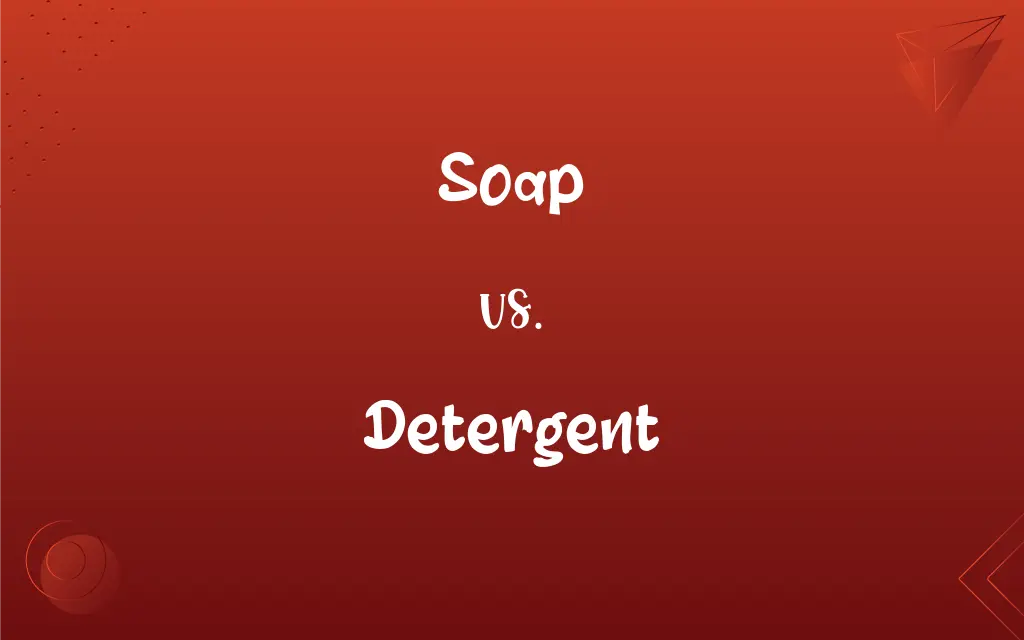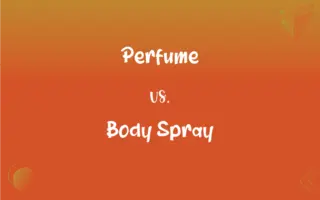Soap vs. Detergent: What's the Difference?
Edited by Janet White || By Harlon Moss || Updated on July 5, 2024
Soap is a natural cleansing agent made from fats and lye; detergent is a synthetic cleaning product designed for specific conditions.

Key Differences
Soap and detergent, though both serve as cleaning agents, have distinct differences in their composition and applications. Soap is typically created by combining fats or oils with an alkali, such as lye. Detergent, conversely, consists of synthetic or man-made compounds.
When it comes to environmental considerations, soap is generally seen as more eco-friendly due to its natural origins. Detergent, being a synthetic compound, might contain chemicals that are less biodegradable, possibly leading to environmental concerns.
The efficacy of soap and detergent varies based on water conditions. Soap tends to leave residues or "soap scum" in hard water, while detergent is crafted to perform well in both hard and soft water.
Soap has a history spanning thousands of years, rooted in ancient civilizations that utilized natural ingredients. Detergent's advent is more recent, with its development primarily occurring in the 20th century as a response to soap's limitations.
In commercial applications, soap is commonly found in personal care products such as bath bars and hand cleansers. Detergent dominates the laundry and dishwashing sectors due to its versatility and efficiency in various water types.
ADVERTISEMENT
Comparison Chart
Base Composition
Made from natural fats/oils and alkali (like lye)
Synthetic or man-made compounds
Environmental Impact
Generally biodegradable and eco-friendly
Might contain less biodegradable chemicals
Performance in Water
Can leave residues in hard water
Performs well in both hard and soft water
Historical Origin
Ancient civilizations, using natural ingredients
Primarily developed in the 20th century
Typical Use
Personal care products (e.g., bath bars)
Laundry and dishwashing products
ADVERTISEMENT
Soap and Detergent Definitions
Soap
A product molded into bars or other shapes.
I bought a bar of lavender soap from the store.
Detergent
A substance for washing or cleaning.
I need a strong detergent for my dirty dishes.
Soap
A cleansing agent made from natural fats.
She made her own soap from olive oil and lye.
Detergent
A product designed for specific cleaning needs.
That's a detergent specially formulated for delicate fabrics.
Soap
A substance used for washing and cleaning.
He used soap to wash his hands thoroughly.
Detergent
A chemical agent that improves water's cleaning ability.
The detergent aids in breaking down the grease on pans.
Soap
A medium for artistic expression or storytelling (e.g., soap opera).
The drama in that soap kept viewers hooked.
Detergent
A synthetic cleaning compound.
This detergent removes even the toughest stains from clothes.
Soap
An agent that reduces surface tension of water.
Soap helps water to spread and wet surfaces more efficiently.
Detergent
A solution used in laboratories to clean equipment.
Ensure the instruments are rinsed well after using the detergent.
Soap
A cleansing agent, manufactured in bars, granules, flakes, or liquid form, made from a mixture of the sodium salts of various fatty acids of natural oils and fats.
Detergent
A cleansing substance that acts similarly to soap but is made from chemical compounds rather than fats and lye.
FAQs
Do soaps perform well in hard water?
Soaps can leave residues or "soap scum" in hard water due to mineral reactions.
Which cleaning agent is newer in historical terms?
Detergent is a more recent invention, primarily developed in the 20th century.
Can soap be used for laundry?
Yes, but detergent is often preferred for its efficacy in varying water conditions.
How is detergent formulated?
Detergent consists of synthetic or man-made compounds, often tailored for specific cleaning needs.
What are the base ingredients in soap?
Soap is typically made from natural fats or oils combined with an alkali, like lye.
Do soaps have a natural scent?
Soaps can have a natural scent from their ingredients, but fragrances can also be added.
What is a common use for detergent besides laundry?
Detergent is commonly used for dishwashing due to its grease-cutting ability.
Why might one choose soap over detergent?
People might choose soap for its natural composition and perceived environmental benefits.
Can detergents be used for personal care?
While some detergents are formulated for personal care, it's vital to choose products specifically designed for direct skin contact.
Which agent is more versatile in water types?
Detergent is more versatile, performing well in both hard and soft water.
Can soap be liquid?
Yes, soap can be formulated as liquid, often seen in hand washes or shower gels.
Can you make soap at home?
Yes, with the right ingredients and safety precautions, you can make soap at home.
Are there eco-friendly detergents?
Yes, many brands offer eco-friendly detergents with biodegradable ingredients.
Why might soap leave a residue on skin or surfaces?
Soap can react with minerals in hard water, leaving a "soap scum" residue.
Are there detergents safe for sensitive skin?
Yes, there are detergents specially formulated for sensitive skin, often labeled as hypoallergenic.
How do detergents help in cleaning?
Detergents break down and lift away dirt and grease, improving water's cleaning ability.
What's a popular soap variant in dramas?
The term "soap opera" refers to a specific kind of drama, initially sponsored by soap companies.
Can soap be synthetic?
Traditional soap is natural, but there are synthetic soap-like cleansers available.
Are there any precautions for storing detergents?
Detergents should be stored out of reach of children and pets, and in a cool, dry place to prevent degradation.
What gives soap its cleansing property?
The saponification process of fats/oils with an alkali gives soap its cleansing property.
About Author
Written by
Harlon MossHarlon is a seasoned quality moderator and accomplished content writer for Difference Wiki. An alumnus of the prestigious University of California, he earned his degree in Computer Science. Leveraging his academic background, Harlon brings a meticulous and informed perspective to his work, ensuring content accuracy and excellence.
Edited by
Janet WhiteJanet White has been an esteemed writer and blogger for Difference Wiki. Holding a Master's degree in Science and Medical Journalism from the prestigious Boston University, she has consistently demonstrated her expertise and passion for her field. When she's not immersed in her work, Janet relishes her time exercising, delving into a good book, and cherishing moments with friends and family.































































